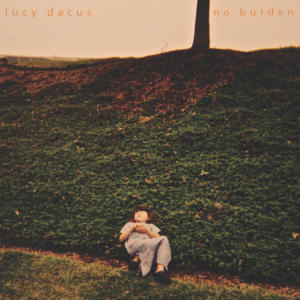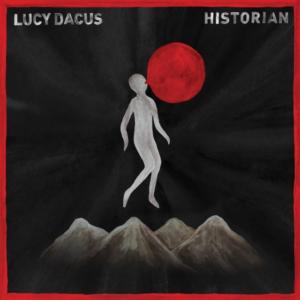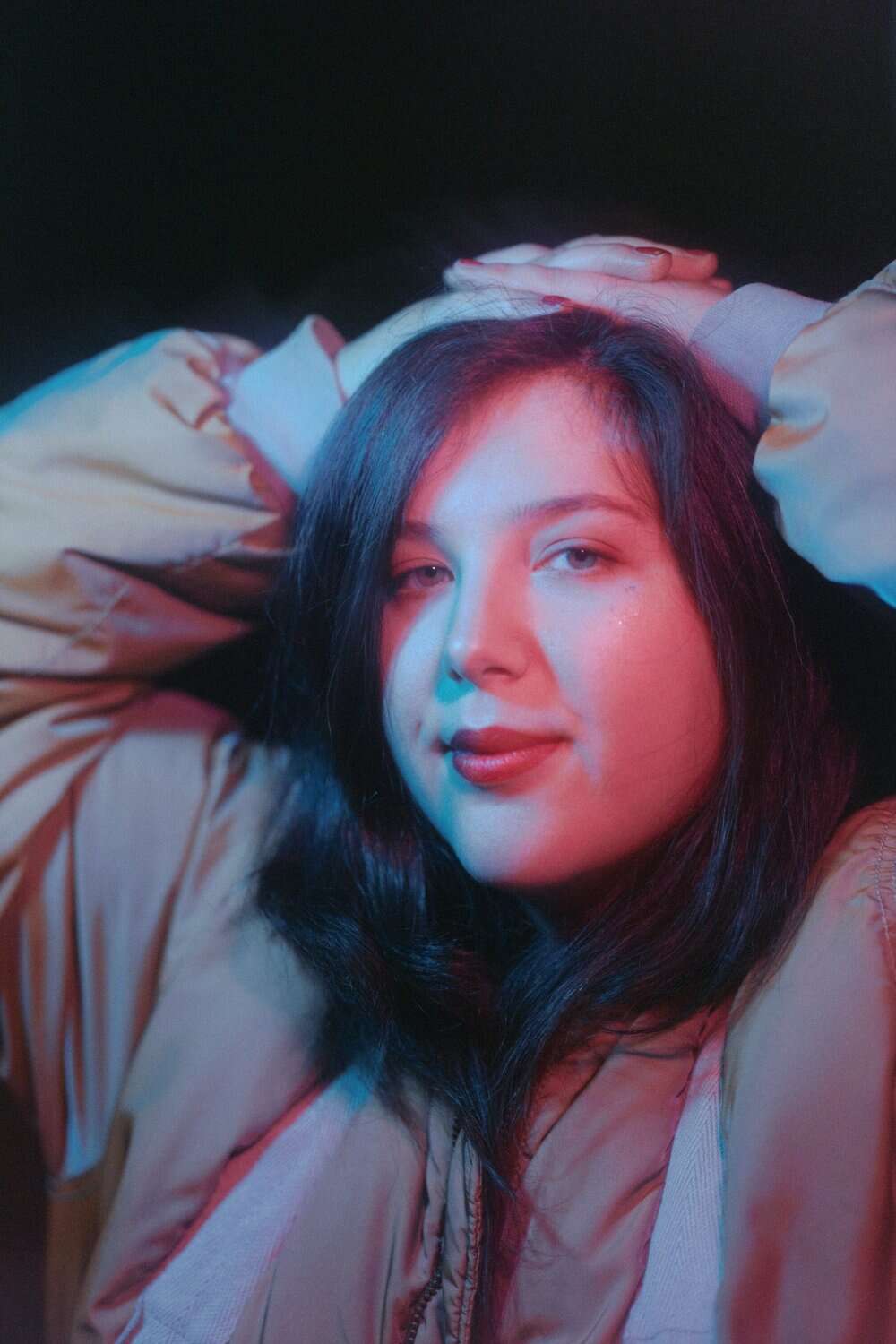Lucy Dacus: It Makes Me Want To Throw Up, & It Makes Me Want To Dance At The Same Time (Interview)
Lucy Dacus is on a roll.
The Richmond, Virginia native’s 2016 debut album, No Burden, earned the singer-songwriter rave reviews and a contract with Matador Record.
Now, Dacus has just released the hotly-anticipated follow-up titled Historian. It’s a highly-personalized concept album…the concept being contemporary life in America.
A few days before the album’s March 2nd release, The 13th Floor’s Marty Duda spoke to Lucy Dacus to discuss the finer points of the new record and to ask how she’s feeling about this all-important second album’s imminent release.
Click here to listen to the interview with Lucy Dacus:
Or, read a transcription of the interview here:
LD: I am in Richmond, Virginia – where I live – and I’m about to leave town tomorrow for tour; so, I’m just walking around my house, touching all my things; getting ready to say good bye.
MD: Yeah, that’s got to be traumatic. So, you’re going on tour, and the record’s released at the end of the week. How does that all make you feel? Are you looking forward to it finally coming out?
LD: It makes me want to throw up, and it makes me want to dance at the same time.
MD: That could be messy.
LD: Yeah. It makes my stomach tight, to think about it, but I can’t wait, really, for people to finally hear it.
MD: I’ve listened to it – I had a chance to listen to it the other day. It’s quite impressive, and it seems like a big step from the previous record. Does it feel like that for you?
 LD: Yeah. A lot more went into it, and it was far more intentional than the first record; and so, I’m prouder of it – even No Burden – and I’m glad that that comes across.
LD: Yeah. A lot more went into it, and it was far more intentional than the first record; and so, I’m prouder of it – even No Burden – and I’m glad that that comes across.
MD: When you say there was more “intention” put into it, I assume you mean that you thought about it more, and it was more planned out; which, I would imagine, would cause you to be more worried about how people look at it as well, because they’re really listening to your decisions and how you approach your music now, more than before. Is that true?
LD: I think I’m less worried, because I made the decisions. I made decisions on No Burden as well, I just wasn’t practiced, and I didn’t know, really, what I wanted. I had never played with a band, and then I was playing with a band and recording, and we only had twenty hours to make it. This time, we had a full week, and I wrote some of the songs with other instruments in mind, and thought of drum parts, thought of some bass parts, and I’m, also, more familiar with gear – I’m not a gear head at all, but I know what’s possible now – and that’s helpful.
MD: So, that all affected the song writing process then?
LD: A little bit. Not really the song writing, but the arranging. I write the same – luckily, that hasn’t been affected by having an audience – but it was good, while we were arranging, to be able to ask for certain tones, and work with Jacob Blizard, our guitarist, who has an insane peddle board, and now I know what they do, and how they can be used.
MD: He’s pretty impressive throughout the record. He seemed to just come in and add a whole new element to whatever song is happening. Was there a lot of discussion, between you and he, about how he would do that?
LD: Yeah. A lot of the ideas were his, but we’d talk though ideas together. Not only did he play most of the guitars, he also played bass, he arranged the strings, he arranged the horns, he did a lot of the synth programming, he did auxiliary percussion, he played Wurlitzer; so, there’s a lot of Jacob on the album.
MD: And how did you connect with him?
LD: We’ve been friends for a while. We met in high school. I met him through our mutual friend, Collin Pastore, who’s also our producer. They went to middle school and high school together, and we just started hanging out and recording. Collin would engineer, Jacob would play instruments, and I would bring in the songs; and that’s just how we hung out. The way that some kids go to movies, or go bowling; that’s just what we do.
MD: It seems to have worked out well for all three of you. It’s pretty amazing!
LD: I know! I feel like we tricked people into letting us do this as our job!
MD: You all went to Nashville to record the album. Is that right?
LD: Yes. Collin lives in Nashville; so, that’s why.
MD: Did the Nashville vibe have anything to do with the outcome of the album, do you think, or was it just a place where the studio happened to be?
LD: It’s funny: I feel really excluded from the Nashville vibe. Everybody’s too clean. The haircuts are too good, everyone has really nice boots, and I don’t wear hats or cowboy hats; but I do love the people. I love the food. I love the weather. It’s a great town, especially because we have friends there. Any town is a great town when you have friends, and I imagine going back there again and again, because the studios, as well, are just incomparable.
MD: This must have been a very different process for you – making this record in a studio like this – than No Burden. How did you deal with that? You kind of mentioned that now you understand what the gear does; but as far as you doing your performances, and putting the thing together, how did that work for you?
LD: It actually felt really similar. I think that’s because Collin and Jacob and I have been working together for so long, that our vocabulary and our pace is the same as it always has been. It doesn’t matter where we’ll be; recording is going to feel the same. It’s just that we had more time this time; so, we just got to talk more. Where we would usually just move on, in the interests of time, we got to think. We didn’t over think: we still only had one week. That’s still not a very long time to make a record…
MD: It seems to be about the right amount of time. I just did a feature on The Doors’ LA Woman album the other day, and it was recorded in six days; whereas, you can spend months on them, obviously, and not have as good a result as that. I think about a week is about right. Then you start over thinking things.
 LD: Yeah. I think people’s first instincts are usually right. It’s a part of who you are. Your first thought is really indicative of your taste; and so, I like to stay as true as I can to my first impulses.
LD: Yeah. I think people’s first instincts are usually right. It’s a part of who you are. Your first thought is really indicative of your taste; and so, I like to stay as true as I can to my first impulses.
MD: I got some press material sent to me, and in it, it referred to the album as being a “concept album of sorts”; and I know that sometimes these things don’t necessarily jibe with the artists’ opinion, themselves, of what they’ve done. Do you consider it somewhat of a concept album, or how would you look at it from that point of view?
LD: I do. It’s not just a collection of songs that I’ve written recently. They definitely have a unifying theme. There aren’t characters, like a novel. If there were, I guess the character is me; so, if that’s a concept, then sure. It’s got a very intentional track list. It progresses in a very intentional way; kind of a deepening sense of dread before some relief. The content starts off with a break up, which is sad, and also kind of victorious – that song is about overcoming – but then it steps further into darkness. I feel like I wanted to lead people into something difficult to look at, but… you don’t want to drag people; you just want to motion them towards it.
MD: Yeah. You don’t want to throw them right into the deep end right away.
LD: Exactly.
MD: One of the most notable things is the very first line of the first song – of Night Shift – which seems to be a pretty startling way of kicking off an album: “The first time I tasted someone else’s spit, I had a coughing fit.” Did you know that you were going to start the album with that line, when it came about? How far in advance did you think this stuff out?
LD: No. I wrote the song before knowing that it would even be on the album. I keep writing songs, and then, one day, it just occurred to me that there were ten that spoke to each other. I’m glad that it’s the first line. I think that it’s a little bit weird. It’s a little bit gross. It’s a little bit funny. It definitely catches people’s ears, and then I’m able to lead them further – like I said before – starting from there.
MD: Do you look at first lines, from your songs, as an important way to kick things off? Is that how you start the song, or does it just evolve when you’re writing your tunes?
LD: There’s not really a set way that I write things, but, usually, a phrase will come to mind, that’s really striking, and one about the chorus or the first line or the last line. It’s usually a centrepiece that the rest of the content fleshes out. I don’t really have a handle on what my song writing process is like; it’s kind of mystical to me. Words just come when they do, and they don’t when they don’t.
MD: Maybe it’s better not to try and find out. Don’t want to mess with something that’s working.
LD: Yeah. I try to stay pretty ignorant.
MD: I was hoping we could just touch on a couple of the songs, and, maybe, you could give me some insight into what’s behind them. One of them, that I was interested in, was Nonbeliever. I was wondering if it was written in regards to a real person?
LD: Yeah, actually, three different people. I started writing that song in 2011, and, actually, it used to be three songs, and none of them were perfect; none of them felt like they were good enough to share; and so, just upon reflection, I noticed that they shared themes, and that there was a verse from one, or a refrain from another, that spoke to each other. I hope it doesn’t feel disjointed to people when they listen to it, but, to me, it’s about three different people in my life, and conversations or moments that we shared.
MD: You’ve got some strings on that. Are they real strings? It sounds like they are.
LD: Yes. We had a cellist, a violinist and a violist.
MD: Being able to say, “I’d like a little string section in this:” was that something new for you to be able to conjure up, and there it was?
LD: Yeah, absolutely! We didn’t have strings or horns on No Burden, but this time around, we knew that some of the songs needed more than just the classic two guitars, bass and drums set up. We had to draw back from using them more than we should have. I didn’t want to put too much on the record, but everywhere that they have ended up being on the record, I think compliments the message of the song.
MD: Speaking of the message of the song: the following track, Yours and Mine: I was wondering if you can give a little insight into that one as well.
LD: I wrote that song in 2015, in reaction to the Baltimore uprising that happened that spring, and it’s about protesting. So it’s about wanting to be present, but people telling you that it’s too dangerous, or even yourself being afraid of the consequences, but knowing that you have to do it in order to feel like you are a contributing member of society. It’s basically, about my decision to protest, and, meanwhile, trying to respect the people that don’t decide to do it, because I don’t want to judge people for their decisions, and I don’t know everyone. Everyone has their reasons for their decisions. So, it’s about that. It’s also applicable to what’s happening now, unfortunately. I wish it wasn’t still relevant, but I feel like it’s more relevant now than it was when I wrote it.
MD: I figured that was the case with the “this ain’t my home anymore” line. Maybe that’s how you were feeling about where you’re at at the moment. Did you actually get out on the street and march and protest? How involved did you get?
LD: In Baltimore, I wasn’t in the country. That’s the other thing: I was in Europe and watching the news, and I had the simultaneous feeling of wanting to stay away, because it just felt really dangerous, and not a place that I would want to live; but then I also wanted to go back immediately and be involved. By the time I got home, there were, not protests, but there was activism on a smaller scale in Richmond, and since then, I have gone to a couple of local protests in DC as well – I went to the women’s march in DC – but touring: I can’t really be that politically active, because we’re driving every day, and we’re playing a show every night. I like to raise money for groups that are active while we’re on the road, just so I feel like I’m still contributing.
MD: One last song to talk about: Next of Kin; if you can touch on that for me please.
LD: I think of that song as the thesis statement of the album. It’s when the album rounds a corner and says, “Pain is a foil to joy, and all of the things that are difficult are also accompanied by things that are really beautiful or fun or life affirming,” and the chorus is, “I am at peace with my death. I can go back to bed,” which was such a relief to actually write, because now I can look back at that song and know that I thought that at one point. I think it’s a relief, when you hear it on the album, just because everything else is rooted in something pretty dark, and then Next of Kin is kind of like a burst of light; at least, I hope that’s what it can be for people.
MD: How are you feeling about presenting these songs live to your fans – to folks who come out to see you? Because they’re fairly personal, and they have, like you say, this dark and light thing happening with them. Do you see that as being something that you have to get through to people when you’re performing?
LD: I’m actually just really excited to play them, because they matter to me, and if all these people are buying tickets to the show – if they’ve bought the record, or even spent the hour to listen to the record… – I feel like I owe people what I have to give. If anything at all, I have my own life to share. It doesn’t make me scared to share things that are really personal, because I think most art is personal, whether people want to admit it or not. I like these songs, they’re relevant to me right now; and so, for that reason, it’s going to feel even better than No Burden…. I still like those songs, but they’re older. Newer material just tends to carry more weight, and I think lots of artists feel that way.
MD: Are you taking a band out on the road?
LD: Yes.
MD: And you have Jacob with you?
LD: Yes.
MD: Hopefully, at some point, you can make your way down to New Zealand. Have you ever been to New Zealand?
LD: Oh my gosh! I’ve never been, and I want to come so bad! I ask, probably, once every couple of months, “Hey, just wondering when we can go to New Zealand and Australia.” They’ll be like, “Well, let’s just wait for the album to come out.” You know the album isn’t even out until Friday; so, who knows?
